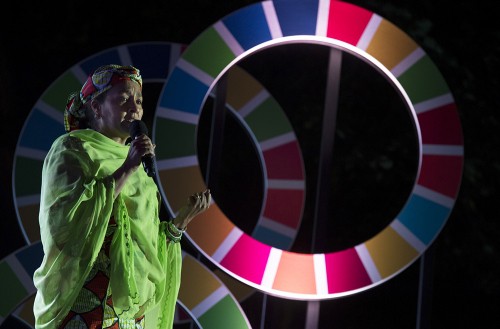Image: Amina Mohammed, Special Advisor of the Secretary-General on Post-2015 Development Planning.
As a narrative specialist, I listen to the stories people tell about their work and their organisations. I help them find out whether their audiences are hearing what they want them to hear, or whether they need to tell the story differently or even find a new story to tell. And I think the development narrative is facing a big challenge just now – what we say we do often doesn’t reflect what we actually do.
The traditional narrative is, of course, about helping those in need – even when that is more about a “hand up” rather than a “handout”. But this doesn’t capture the reciprocal and partnership nature of everyday development practice as most of us on the ground know it. Nor does the traditional aid narrative speak to the stories now being told around the Sustainable Development Goals: this will surely make it even tougher to achieve them.
There are reasons why the old development narrative persists. It can be hard to raise money and gain public support among some sectors of society with anything other than a narrative that says: “There is a crisis, the vulnerable need our help, please give, thank you, see you next time”.
Yet, close up, development work often looks more like complex cross-cultural collaboration than one-directional assistance. And the old story also fails to capture the vitality of culture in a global society. It misses much of what’s promising and hopeful and full of potential.
As globalisation and complex interdependence among countries become the norm – and touch the lives of everyone – the challenges for the development sector grow. But so do the opportunities.
Roche and Hudson have pointed out that the challenges facing the development sector cut across program development, self-reflection, and the sector narrative. None of these elements of the plot can be considered in isolation: what we do, how we analyse what we do, and the stories we tell about our work – both among ourselves and to the outside world – are intrinsically linked.
Commentators such as Deborah Doane argue that the development narrative needs to more closely resemble reality. New conflicts, shifts in power blocs and alignments, global warming and colossal political, technological, and demographic transformation all mean that the world bears little resemblance to the one in which INGOs set the aid agenda in the 1980s and 1990s. Doane points out, for instance, that seven of the largest development organisations in the UK (Oxfam, Christian Aid, Action Aid, Cafod, World Vision, Tearfund, Save the Children) now have a combined income of more than £1bn – yet it’s hard to argue that their influence and impact reflect this.
Part of the new reality is that our global society keeps changing. Today, the lives of high-to-middle-income households in places as diverse as Sao Paulo, Bangkok and Mumbai have more in common with the lives of people on similar incomes in Melbourne and London than they do with those who still live in poverty in what was once called the global south. Our world is no longer about rich and poor countries; the new story is one in which geographic location doesn’t necessarily define – or limit – one’s life experience.
There’s a great opportunity here. We can craft a more grown-up – and inspiring – development narrative that emphasises cooperation and the value of cultural exchange. It is the story of ‘us all, together on a small planet’, instead of ‘us over here and them over there, waiting for help’.
There are persuasive stories to be told of people working together – both within and between countries. I know from my own experience that working in partnership with people in other countries produces exhilarating and moving content.
A great example of a more collaborative story in development can be found in Zalissa’s Choice from the Dutch organisation Kinderpostzegels. The strength of the local voice – and the rich cultural content – make Zalissa’s Choice a more nuanced, persuasive and empowering story than most. It gets my money: I am learning, and I am joining a global conversation about child marriage and human rights.
The energy of these kinds of partnerships and stories will surely inspire the growth of new types of development practice. This will lead the development story away from foreign aid to embrace the realities of living together in one world.
The inspiration behind this new narrative is the same one that has motivated people to travel around the world since time immemorial: to exchange ideas and goods, to learn about each other, and to be part of a global community. We will find that this is less fatiguing than the narrative we have now because it evokes values we all share.
As storytellers, we should not be disheartened by the complexity of the development narrative. There is a huge part of living in a complex, globalised world that is, in fact, very compelling. It all comes down to emotion and the way we tell our stories.










